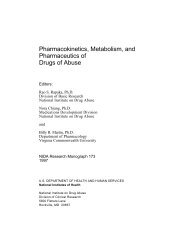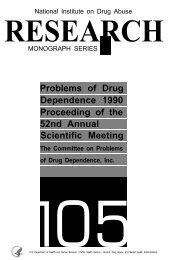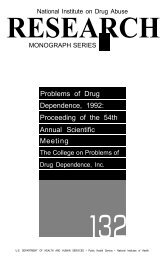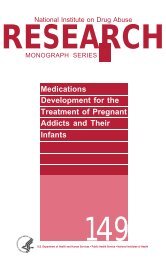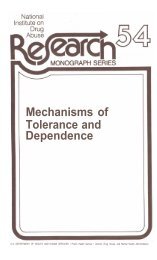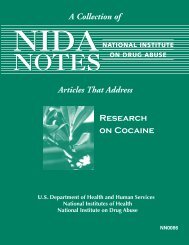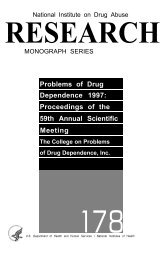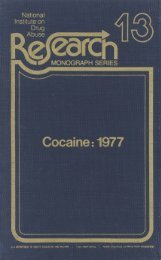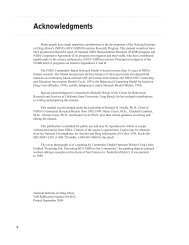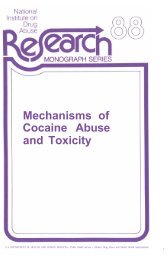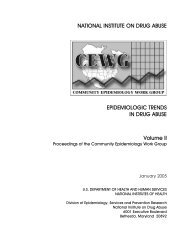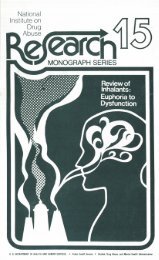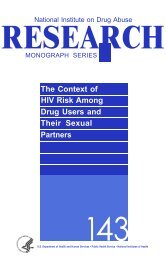Epidemiology of Inhalant Abuse - Archives - National Institute on ...
Epidemiology of Inhalant Abuse - Archives - National Institute on ...
Epidemiology of Inhalant Abuse - Archives - National Institute on ...
Create successful ePaper yourself
Turn your PDF publications into a flip-book with our unique Google optimized e-Paper software.
toluene, benzene, and hydrocarb<strong>on</strong>s. Furthermore, some chr<strong>on</strong>ic abusers<br />
were found to manifest signs <str<strong>on</strong>g>of</str<strong>on</strong>g> mental disorder, electroencephalogram<br />
abnormalities, malignant anemia, brain damage, and violent behavior.<br />
Other associated effects <str<strong>on</strong>g>of</str<strong>on</strong>g> inhalant abuse include accidents and<br />
aggravati<strong>on</strong> <str<strong>on</strong>g>of</str<strong>on</strong>g> other illnesses. Criminal behavior was found to be related<br />
to inhalant abuse. Some social effects include disrupti<strong>on</strong> <str<strong>on</strong>g>of</str<strong>on</strong>g> family life<br />
and lack <str<strong>on</strong>g>of</str<strong>on</strong>g> interest in schoolwork and pers<strong>on</strong>al hygiene am<strong>on</strong>g the users.<br />
Preventive Interventi<strong>on</strong> and Treatment<br />
All countries have indicated great c<strong>on</strong>cern about the inhalant abuse<br />
problem. Preventive strategies have been implemented as a means <str<strong>on</strong>g>of</str<strong>on</strong>g><br />
c<strong>on</strong>trol, mainly through health educati<strong>on</strong> targeted at the young<br />
populati<strong>on</strong>. Drug treatment facilities in some countries such as Thailand,<br />
the Philippines, and Singapore have accommodated inhalant abusers.<br />
They include both inpatient and outpatient services. Supervisi<strong>on</strong> and<br />
counseling programs are available in most countries. A multidimensi<strong>on</strong>al<br />
approach to preventi<strong>on</strong> <str<strong>on</strong>g>of</str<strong>on</strong>g> inhalant abuse that involves various groups and<br />
settings such as schools, the community, and social workers was found to<br />
be an effective means to address the problem.<br />
Some form <str<strong>on</strong>g>of</str<strong>on</strong>g> legislative c<strong>on</strong>trol <str<strong>on</strong>g>of</str<strong>on</strong>g> inhalant abuse is present in most<br />
countries. However, the degree <str<strong>on</strong>g>of</str<strong>on</strong>g> severity <str<strong>on</strong>g>of</str<strong>on</strong>g> c<strong>on</strong>trol differs am<strong>on</strong>g the<br />
countries.<br />
REFERENCES<br />
Arnold, A.K. “A Study <str<strong>on</strong>g>of</str<strong>on</strong>g> Solvent <str<strong>on</strong>g>Abuse</str<strong>on</strong>g> Awareness in Selected New<br />
Zealand Sec<strong>on</strong>dary Schools.” Paper presented to NSAD Summer<br />
School <strong>on</strong> Alcohol, Drugs and Chemical Dependency, Wellingt<strong>on</strong>,<br />
NZ, 1983.<br />
Associati<strong>on</strong> <str<strong>on</strong>g>of</str<strong>on</strong>g> Southeast Asian Nati<strong>on</strong>s. “Singapore Country Report.”<br />
Report <str<strong>on</strong>g>of</str<strong>on</strong>g> the Tenth Meeting <str<strong>on</strong>g>of</str<strong>on</strong>g> ASEAN Senior Officials <strong>on</strong> Drug<br />
Matters, September 29-October 3, 1986. Manila: ASEAN Secretariat,<br />
1986. pp 1-10.<br />
Birdling, J. “The Sniffing Problem.” Paper presented at NSAD Summer<br />
School <strong>on</strong> Alcohol, Drugs and Chemical Dependency, Wellingt<strong>on</strong>,<br />
NZ, February 3-5, 1981.<br />
Brady, M. Bibliography: Petrol Sniffing and Other Volatile Solvent<br />
<str<strong>on</strong>g>Abuse</str<strong>on</strong>g> in Australia and Overseas. Canberra, Australia: Alcohol and<br />
Drug Foundati<strong>on</strong>, 1990.<br />
47



